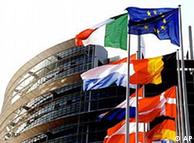 Two new countries joined the EU on New Year’s Day. Bulgaria and Romania brought the total number of EU countries to 27. The countries add a population 30 million to the EU’s existing 460 million, but they will add just 1 per cent to its economic output. Irish PM Bertie Ahern said yesterday’s accession was a "cause for celebration". He continued, "I have every confidence that accession to the Union will be as significant and as positive for Bulgaria and Romania as it has been for Ireland."
Two new countries joined the EU on New Year’s Day. Bulgaria and Romania brought the total number of EU countries to 27. The countries add a population 30 million to the EU’s existing 460 million, but they will add just 1 per cent to its economic output. Irish PM Bertie Ahern said yesterday’s accession was a "cause for celebration". He continued, "I have every confidence that accession to the Union will be as significant and as positive for Bulgaria and Romania as it has been for Ireland."Not everyone shares Ahern’s optimism about the EU newest members. Bulgaria and Romania were deemed too politically and economically backward for membership during the EU's first ten-member eastward expansion in 2004. Now almost half of the EU are former eastern bloc countries that were in the shadow of the Soviet Union until 1989. However this likely to be the limit of EU expansion for the foreseeable future. Europe is suffering from “enlargement fatigue". Countries in the queue such as Turkey, Croatia and the southern Balkan countries will have to wait until at least 2010.
No such problems for Romania and Bulgaria. Crowds in Bucharest and Sofia brought in the New Year with street parties and spectacular fireworks to mark their countries new status. Bulgarian President Georgi Purvanov said in a speech in Sofia that 1 January 2007, was the most important date in his country's history. In capital, Bucharest, President Traian Basescu told a cheering crowd packing University Square that Romania has finally arrived in Europe. 80% of Romanians support the accession to the EU.
It will take years for the countries to join the more exclusive club of countries using the euro currency. Of the 2004 expansion countries only Slovenia has achieved the economic stability required to join the euro club. They became the 13th EU country to remove their local currency (the tolar) and implement the euro on 1 January. Malta is likely to be the 14th in 2008.
Several EU states have put restrictions on the number of Romanian and Bulgarian workers, fearing a huge influx. Predictions on how many will come to Britain vary from 56,000 to 180,000 in the first year. Unlike the open door policy of 2004, the British Home Office plans to limit the right to work for Bulgarians and Romanians. Unskilled workers will initially be limited to quota-based schemes in the agricultural and food processing sectors. Skilled workers can get a permit, if they are students, or self-employed. The Conservative opposition said allowing any EU citizen to work in the UK if they were self-employed was a "big loophole".
 Romania is the bigger of the new entrants with 21 million inhabitants. Wallachia and Moldavia were provinces of the Ottoman Empire for many centuries before securing independence under the new name of Romania in 1856. It fought on the side of Hitler in World War II. The post-war Soviet occupation led to the formation of a communist "people's republic" in 1947. Nicolae Ceaucescu’s rule was brought to a bloody end in 1989. Surprisingly, the Communists dominated elections ever since. Romania was admitted to NATO in 2004. The current government is a coalition of four parties led by the National Liberal Party.
Romania is the bigger of the new entrants with 21 million inhabitants. Wallachia and Moldavia were provinces of the Ottoman Empire for many centuries before securing independence under the new name of Romania in 1856. It fought on the side of Hitler in World War II. The post-war Soviet occupation led to the formation of a communist "people's republic" in 1947. Nicolae Ceaucescu’s rule was brought to a bloody end in 1989. Surprisingly, the Communists dominated elections ever since. Romania was admitted to NATO in 2004. The current government is a coalition of four parties led by the National Liberal Party. Bulgaria re-elected its pro-European Socialist President Georgi Parvanov in October 2006. He won with a 75% landslide. Bulgaria has 8 million people and was an Ottoman province like its neighbour. Bulgaria won independence in 1878. It suffered a major defeat in the 1913 Balkans War and its losses were compounded when it entered World War I on the side of the Central Powers. It was also an ally of Hitler and was occupied by the Red Army at the end of World War II. Bulgaria had a peaceful transition to democracy in 1989 but has found the transition to democracy and a market economy difficult after the collapse of communism.
Throughout the first half of the decade that followed, Bulgaria suffered severe political instability and strikes. Matter improved under former king Simeon II, who as prime minister between 2001 and 2005, forced through market reforms to meet EU economic targets. Corruption and organised crime remain issues of concern. Bulgaria will also be looking to the EU to help free five of its nationals imprisoned in Libya. Five Bulgarian nurses, along with a Palestinian doctor, were sentenced to death on December 19 for deliberately infecting 426 children with HIV in 1999. Tripoli claims 50 dead children were injected with HIV in a botched attempt to find a cure for AIDS.
No comments:
Post a Comment